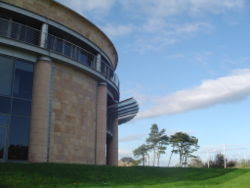Parted per saltire Argent and Azure, in chief a book expanded proper leaved Gules, and in base a lion rampant of the last armed and langued of the second, on a chief of the fourth a crescent reversed of the first between two mascles Or.
The University of St Andrews is the oldest university in Scotland and third oldest in the English-speaking world, having been founded between 1410 and 1413. The University is situated in the town of St Andrews, in Fife, on the east coast of Scotland. It is a renowned centre for teaching and research and is a member of the 1994 Group, a network of smaller research-intensive British universities. Independent school intake is high, but the university has a widening participation policy.

The library and many university departments are spread around the town centre. The town's population of 16,000 is boosted considerably by the University's 8,000 students. St Andrews is frequently listed among the top universities in the United Kingdom. Until 1967, a large part of the University of St Andrews was located in the nearby city of Dundee, separating to become the University of Dundee.
History of the University

Founded in 1413, St Andrews is the oldest university in Scotland. By the middle of the sixteenth century the University had three colleges - St Salvator's (1450), St Leonard's (1511), and St Mary's (1538): the buildings of St Mary's College and St Salvator's Chapel both date from this period.
The 16th to 18th centuries saw a period of mixed fortunes for the University. During this time St Salvator's and St Leonard's Colleges joined to form the United College which still survives in a greatly enlarged form.
In the 19th century the University made considerable progress in developing teaching and research in the Arts, Divinity and the Biological and Physical Sciences. In 1897 the University was joined by a new academic centre in Dundee and with it gained notable achievements in Medical and Applied Science. This association ended in 1967 with the foundation of a separate University of Dundee.
The University history, its personalities and its teaching practices can be traced through the collections of documents, art works, furniture, laboratory equipment and specimens that it has accumulated in its Museum collections.

Faculties
The University is divided into four academic Faculties:
Arts
Divinity
Medicine
Science
Each is governed by a Faculty Council and administered by a Dean. Students apply to become members of a particular faculty, as opposed to any particular school or department.
Rankings

The independent IpsosMORI National Student Survey 2006 commissioned by HEFCE placed it third among the UK universities. It has achieved the most consistently high ratings in research assessment exercises with no subjects receiving a rating lower than 4 on a grading scale 1-5*, where 5* denotes outstanding international research. The departments of English and Psychology have received a 5* in the latest exercise, and 72% of staff across the university received a 5 or 5* rating.The Philosophical Gourmet report ranks St Andrews' graduate philosophy programme as third in the UK, and the joint programme with Stirling University is ranked second in the UK and joint 13th in the world.
Nearly eight in ten graduates obtain a First Class or an Upper Second Class Honours degree. A similar proportion enter further employment requiring a respected degree or obtaining placements for further postgraduate research. The ancient Scottish universities award Master of Arts degrees (except for science students who are awarded a Bachelor of Science degree) which are classified upon graduation, in contrast to Oxbridge where one becomes a Master of Arts after a certain number of years, and the rest of the UK, where graduates are awarded BAs.

Entry to the University is highly competitive; the latest UCAS figures show that there are generally twelve applications for every place available, and the University has not entered Clearing since 2003. The standard offer of a place tends to require at a minimum AAABB at Scottish Highers for Scottish applicants, AAB at GCE A Levels for English, Welsh and Northern Irish candidates, or a score of at least 36 points on the International Baccalaureate. They have a noted preference for candidates who already have these qualification, something that implicitly gives preference to Scottish applicants as they will have normally completed the Scottish Highers when they apply, whereas other applicants, such as those studying in England, are still in the process of attaining their final secondary qualifications.
University of St Andrews ranked 76th in the 2007 THES-QS World University ranking
University of St Andrews ranked 83rd in the 2008 THES-QS World University ranking
University of St Andrews ranked 87th in the 2009 THES-QS World University ranking
University of St Andrews ranked 95th in the 2010 QS World University ranking
University of St Andrews ranked 97th in the 2011 QS World University ranking


